初中英语现在完成时
- 格式:doc
- 大小:142.50 KB
- 文档页数:14
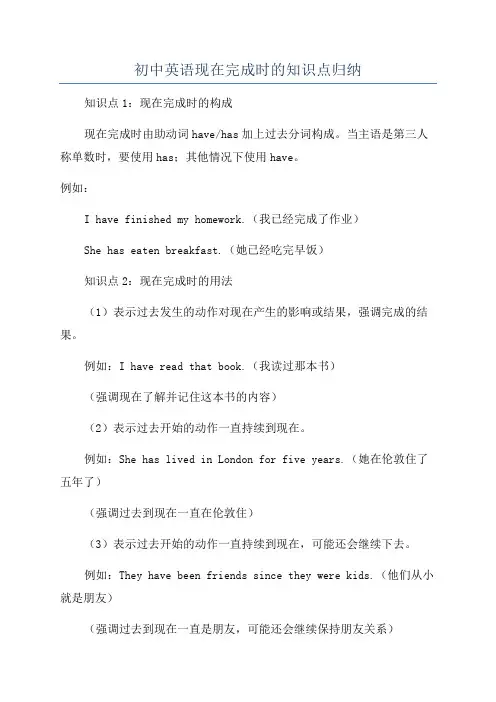
初中英语现在完成时的知识点归纳知识点1:现在完成时的构成现在完成时由助动词have/has加上过去分词构成。
当主语是第三人称单数时,要使用has;其他情况下使用have。
例如:I have finished my homework.(我已经完成了作业)She has eaten breakfast.(她已经吃完早饭)知识点2:现在完成时的用法(1)表示过去发生的动作对现在产生的影响或结果,强调完成的结果。
例如:I have read that book.(我读过那本书)(强调现在了解并记住这本书的内容)(2)表示过去开始的动作一直持续到现在。
例如:She has lived in London for five years.(她在伦敦住了五年了)(强调过去到现在一直在伦敦住)(3)表示过去开始的动作一直持续到现在,可能还会继续下去。
例如:They have been friends since they were kids.(他们从小就是朋友)(强调过去到现在一直是朋友,可能还会继续保持朋友关系)知识点3:现在完成时的时间状语现在完成时常与以下时间状语连用:just(刚刚)、already(已经)、never(从来没有)、ever(曾经)、yet(还、仍然)、recently (最近)、since(自从)、for(持续了多久)等。
例如:I have just finished my homework.(我刚刚完成了作业)Have you ever been to America?(你去过美国吗?)They haven't seen each other since last year.(他们自从去年就没有见过面了)知识点4:现在完成时与一般过去时的区别现在完成时强调的是过去的动作对现在的影响或结果,而一般过去时只表示过去发生的动作或状态。
例如:He has lost his key.(他丢了钥匙,结果是他现在找不到)He lost his key.(他丢了钥匙)知识点5:现在完成时否定句和疑问句的构成现在完成时的否定句和疑问句构成是在助动词have/has之后加not 或否定词,疑问句将助动词have/has提到句首。
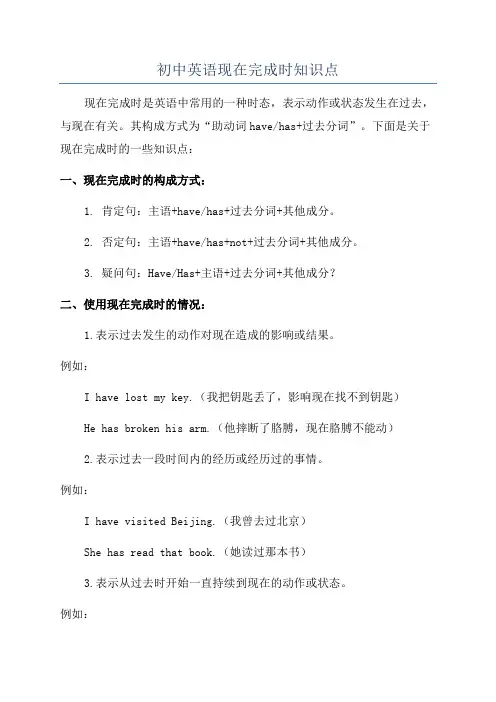
初中英语现在完成时知识点现在完成时是英语中常用的一种时态,表示动作或状态发生在过去,与现在有关。
其构成方式为“助动词have/has+过去分词”。
下面是关于现在完成时的一些知识点:一、现在完成时的构成方式:1. 肯定句:主语+have/has+过去分词+其他成分。
2. 否定句:主语+have/has+not+过去分词+其他成分。
3. 疑问句:Have/Has+主语+过去分词+其他成分?二、使用现在完成时的情况:1.表示过去发生的动作对现在造成的影响或结果。
例如:I have lost my key.(我把钥匙丢了,影响现在找不到钥匙)He has broken his arm.(他摔断了胳膊,现在胳膊不能动)2.表示过去一段时间内的经历或经历过的事情。
例如:I have visited Beijing.(我曾去过北京)She has read that book.(她读过那本书)3.表示从过去时开始一直持续到现在的动作或状态。
例如:I have lived in this city for ten years.(我在这个城市住了十年了)He has worked here since 2024.(他从2024年开始在这里工作)三、现在完成时和过去时的区别:1.现在完成时强调的是过去发生的动作对现在造成的影响或结果,而过去时则强调过去发生的动作并没有与现在产生任何关系。
例如:I have finished my homework.(我已经完成了作业,现在可以放松了)I finished my homework.(我完成了作业,但现在可能还有别的事情要做)2. 现在完成时通常与表示时间段的副词连用,如already(已经)、yet(还)、never(从未)、ever(曾经)、just(刚刚)等,而过去时则没有这种固定搭配。
例如:I have already eaten lunch.(我已经吃过午饭了)I ate lunch.(我吃了午饭)四、现在完成时常见的时间状语:1. 现在完成时常与一段时间的延续连用,如for(表示一段时间)、since(表示自从一些时间点以来)等。
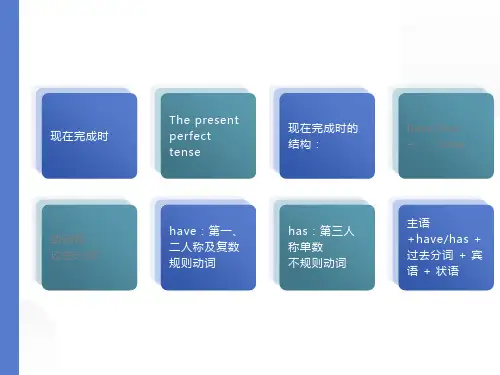
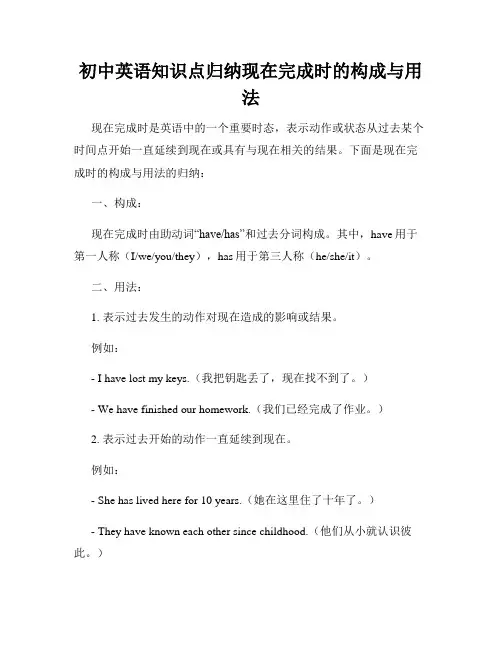
初中英语知识点归纳现在完成时的构成与用法现在完成时是英语中的一个重要时态,表示动作或状态从过去某个时间点开始一直延续到现在或具有与现在相关的结果。
下面是现在完成时的构成与用法的归纳:一、构成:现在完成时由助动词“have/has”和过去分词构成。
其中,have用于第一人称(I/we/you/they),has用于第三人称(he/she/it)。
二、用法:1. 表示过去发生的动作对现在造成的影响或结果。
例如:- I have lost my keys.(我把钥匙丢了,现在找不到了。
)- We have finished our homework.(我们已经完成了作业。
)2. 表示过去开始的动作一直延续到现在。
例如:- She has lived here for 10 years.(她在这里住了十年了。
)- They have known each other since childhood.(他们从小就认识彼此。
)3. 表示过去发生的动作在过去的某个时间结束,但对现在仍然有影响。
例如:- He has studied English for three hours.(他学习英语已经三个小时了,仍在学习。
)- They have been friends since they met in high school.(自从高中认识以来,他们一直是朋友。
)4. 表示过去发生的动作在过去的某个时间结束,且不再持续到现在。
例如:- I have seen that movie before.(我以前看过那部电影。
)- She has already eaten lunch.(她已经吃过午饭了。
)5. 现在完成时经常与表示时间的状语连用,如already(已经)、just(刚刚)、never(从未)、ever(曾经)、yet(还)等。
例如:- Have you ever been to Beijing?(你曾经去过北京吗?)- They have just arrived.(他们刚刚到达。
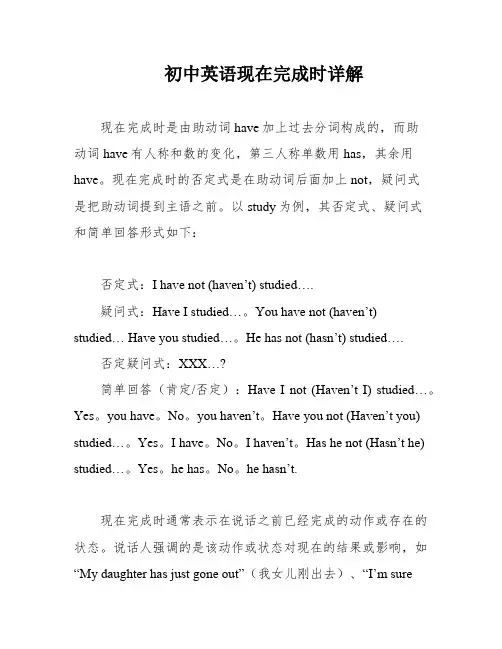
初中英语现在完成时详解现在完成时是由助动词have加上过去分词构成的,而助动词have有人称和数的变化,第三人称单数用has,其余用have。
现在完成时的否定式是在助动词后面加上not,疑问式是把助动词提到主语之前。
以study为例,其否定式、疑问式和简单回答形式如下:否定式:I have not (haven’t) studied….疑问式:Have I studied…。
You have not (haven’t) studied… Have you studied…。
He has not (hasn’t) studied….否定疑问式:XXX…?简单回答(肯定/否定):Have I not (Haven’t I) studied…。
Yes。
you have。
No。
you haven’t。
Have you not (Haven’t you) studied…。
Yes。
I have。
No。
I haven’t。
Has he not (Hasn’t he) studied…。
Yes。
he has。
No。
he hasn’t.现在完成时通常表示在说话之前已经完成的动作或存在的状态。
说话人强调的是该动作或状态对现在的结果或影响,如“My daughter has just gone out”(我女儿刚出去)、“I’m surewe’ve met before”(我肯定我们以前见过面)和“She has arrived”(她到了)等。
此外,现在完成时还可以表示持续到现在的动作或状态,往往和包括现在在内的表示一段时间的状语连用,如recently、already、just、lately、for…、since…、yet等。
例如,“I haven’t heard from her these days”(这些日子我没有收到她的信)和“XXX”(最近我们没有见到你)等。
还有一些表示时间的短语也可以和现在完成时连用,如:①for+时段②since+过去一个时间点(译为:自从……以来)③since+时段+ago④since+从句(过去时)Mary has been ill for three days。
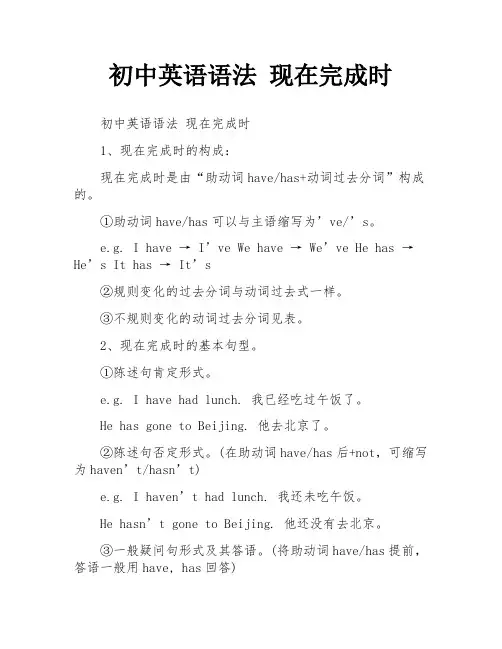
初中英语语法现在完成时初中英语语法现在完成时1、现在完成时的构成:现在完成时是由“助动词have/has+动词过去分词”构成的。
①助动词have/has可以与主语缩写为’ve/’s。
e.g. I have → I’ve We have → We’ve He has → He’s It has → It’s②规则变化的过去分词与动词过去式一样。
③不规则变化的动词过去分词见表。
2、现在完成时的基本句型。
①陈述句肯定形式。
e.g. I have had lunch. 我已经吃过午饭了。
He has gone to Beijing. 他去北京了。
②陈述句否定形式。
(在助动词have/has后+not,可缩写为haven’t/hasn’t)e.g. I haven’t had lunch. 我还未吃午饭。
He hasn’t gone to Beijing. 他还没有去北京。
③一般疑问句形式及其答语。
(将助动词have/has提前,答语一般用have, has回答)e.g. Have you had lunch? 你吃过午饭了没? Yes, I have. No, I haven’t.Has he gone to Beijing? 他去过北京了没有? Yes, he has. No, he hasn’t.否定回答还可以用:No, not yet. / No, never. / No, not even once等。
④特殊疑问句形式。
(疑问词+一般疑问句)e.g. Where has he gone? 他去了哪里?3、现在完成时的三个基本用法。
(1) 现在完成时的第一个基本用法表示过去发生或已完成的某一个动作对现在造成的影响或结果。
e.g. Have you had lunch? Yes, I have. I’ve just had it. 你吃过午饭没?有,吃过了,我刚刚吃的。
(影响及结果:我现在饱了,不需要了)He has gone to Beijing. 他已经去北京了。

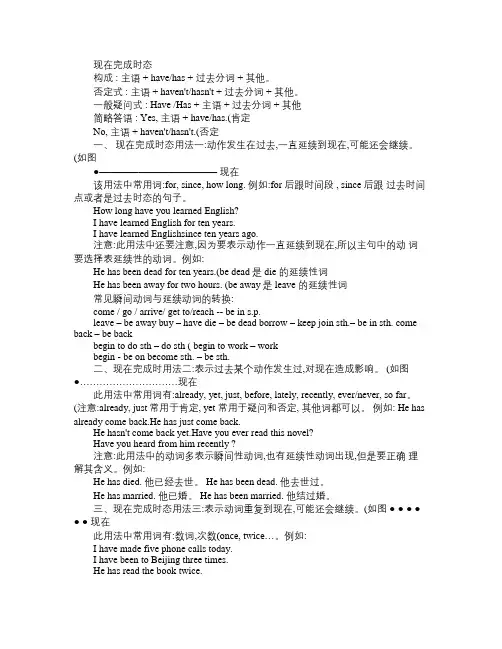
现在完成时态构成 : 主语 + have/has + 过去分词 + 其他。
否定式 : 主语 + haven't/hasn't + 过去分词 + 其他。
一般疑问式 : Have /Has + 主语 + 过去分词 + 其他简略答语 : Yes, 主语 + have/has.(肯定No, 主语 + haven't/hasn't.(否定一、现在完成时态用法一:动作发生在过去,一直延续到现在,可能还会继续。
(如图●————————————现在该用法中常用词:for, since, how long. 例如:for 后跟时间段 , since 后跟过去时间点或者是过去时态的句子。
How long have you learned English?I have learned English for ten years.I have learned Englishsince ten years ago.注意:此用法中还要注意,因为要表示动作一直延续到现在,所以主句中的动词要选择表延续性的动词。
例如:He has been dead for ten years.(be dead是 die 的延续性词He has been away for two hours. (be away是 leave 的延续性词常见瞬间动词与延续动词的转换:come / go / arrive/ get to/reach -- be in s.p.leave – be away buy – have die – be dead borrow – keep join sth.– be in sth. come back – be backbegin to do sth – do sth ( begin to work – workbegin - be on become sth. – be sth.二、现在完成时用法二:表示过去某个动作发生过,对现在造成影响。
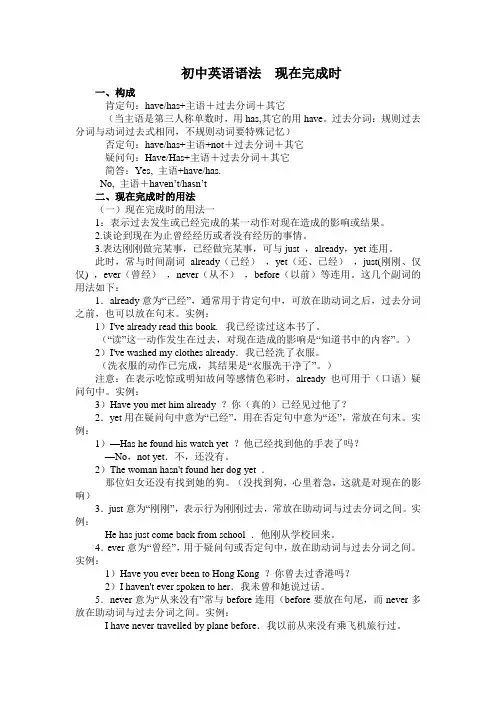
初中英语语法现在完成时一、构成肯定句:have/has+主语+过去分词+其它(当主语是第三人称单数时,用has,其它的用have。
过去分词:规则过去分词与动词过去式相同,不规则动词要特殊记忆)否定句:have/has+主语+not+过去分词+其它疑问句:Have/Has+主语+过去分词+其它简答:Yes, 主语+have/has.No, 主语+haven’t/hasn’t二、现在完成时的用法(一)现在完成时的用法一1:表示过去发生或已经完成的某一动作对现在造成的影响或结果。
2.谈论到现在为止曾经经历或者没有经历的事情。
3.表达刚刚做完某事,已经做完某事,可与just ,already,yet连用。
此时,常与时间副词already(已经),yet(还、已经),just(刚刚、仅仅) ,ever(曾经),never(从不),before(以前)等连用。
这几个副词的用法如下:1.already意为“已经”,通常用于肯定句中,可放在助动词之后,过去分词之前,也可以放在句末。
实例:1)I've already read this book. 我已经读过这本书了。
(“读”这一动作发生在过去,对现在造成的影响是“知道书中的内容”。
)2)I've washed my clothes already.我已经洗了衣服。
(洗衣服的动作已完成,其结果是“衣服冼干净了”。
)注意:在表示吃惊或明知故问等感情色彩时,already也可用于(口语)疑问句中。
实例:3)Have you met him already ?你(真的)已经见过他了?2.yet用在疑问句中意为“已经”,用在否定句中意为“还”,常放在句末。
实例:1)—Has he found his watch yet ?他已经找到他的手表了吗?—No,not yet.不,还没有。
2)The woman hasn't found her dog yet .那位妇女还没有找到她的狗。
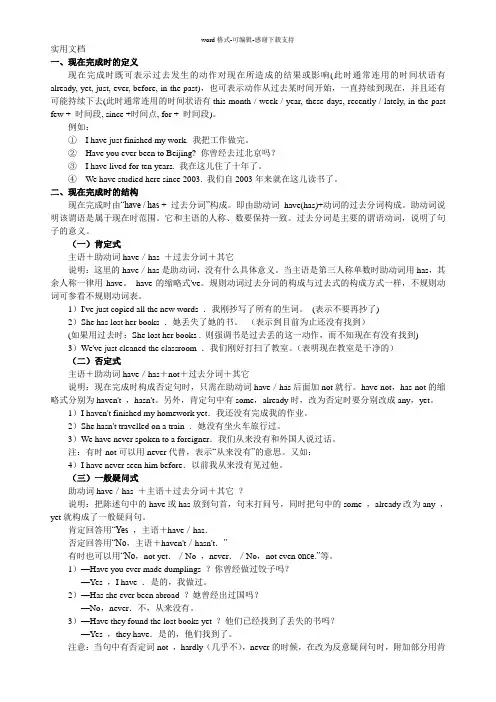
一、现在完成时的定义现在完成时既可表示过去发生的动作对现在所造成的结果或影响(此时通常连用的时间状语有already, yet, just, ever, before, in the past),也可表示动作从过去某时间开始,一直持续到现在,并且还有可能持续下去(此时通常连用的时间状语有this month / week / year, these days, recently / lately, in the past few + 时间段, since +时间点, for + 时间段)。
例如:①I have just finished my work. 我把工作做完。
②Have you ever been to Beijing? 你曾经去过北京吗?③I have lived for ten years. 我在这儿住了十年了。
④We have studied here since 2003. 我们自2003年来就在这儿读书了。
二、现在完成时的结构现在完成时由“have / has + 过去分词”构成。
即由助动词have(has)+动词的过去分词构成。
助动词说明该谓语是属于现在时范围。
它和主语的人称、数要保持一致。
过去分词是主要的谓语动词,说明了句子的意义。
(一)肯定式主语+助动词have/has +过去分词+其它说明:这里的have/has是助动词,没有什么具体意义。
当主语是第三人称单数时助动词用has,其余人称一律用have。
have的缩略式've。
规则动词过去分词的构成与过去式的构成方式一样,不规则动词可参看不规则动词表。
1)I've just copied all the new words .我刚抄写了所有的生词。
(表示不要再抄了)2)She has lost her books .她丢失了她的书。
(表示到目前为止还没有找到)(如果用过去时:She lost her books . 则强调书是过去丢的这一动作,而不知现在有没有找到)3)We've just cleaned the classroom .我们刚好打扫了教室。

初中英语语法现在完成时现在完成时的构成:主语 + have/has + 过去分词 + 其他。
(当主语是第三人称单数时用has,其余人称用have。
过去分词:规则动词的过去分词构成与动词过去式相同;不规则动词需要特殊记忆。
)否定式:主语 + haven't/hasn't + 过去分词 + 其他。
疑问式: Have /Has + 主语 + 过去分词 + 其他?简略答语: Yes, 主语 + have/has.(肯定)No, 主语 + haven't/hasn't.(否定)表示过去发生或完成的某一动作对现在造成的影响或结果。
例如:I have just cleaned my clothes. 我刚洗过衣服。
(“洗衣服”是发生在过去的动作,对现在造成的结果是“衣服干净了”)现在完成时常用的时间状语有:already (”已经”用于肯定句的中间和末尾处)never (“从不”用于中间处)ever (”曾经”用于疑问句和肯定句的中间处)just (“刚刚”用于中间处)yet (“已经”用于疑问句的末尾处/ “还”用于否定句的末尾处)或不加任何的时间状语,但不能和表示过去的时间状语连用.以so far为标志so far往往表示到目前为止动作或状态已经发生。
过去已经开始的动作一直延续到现在, 甚至有可能继续延续下去,我们可以从动作“延续”的特性和“时间”点段的区分入手,进一步学习现在完成时。
Since 和 for 的用法表示过去已经开始持续到现在的动作或状态常用的时间状语有:for, since, how long, so far, these days等。
Since+过去点的时间,for+一段时间(数词+量词),此划线部分用how long提问。
一、since短语或从句表示过去的动作延续至今,since之后的时间为一点。
如:Mr. Smith has worked here since 1984. 1984年以来,史密斯先生一直在这工作*“终二、for短语表示动作延续多长时间,for的宾语为时间段。
初中英语现在完成时知识点现在完成时(Present Perfect Tense)是表示过去发生的动作或状态对现在造成的影响或结果的一种时态。
以下是现在完成时的知识点:1. 构成:现在完成时由助动词“have/has”和动词的过去分词构成。
其中,主语为第三人称单数时,要用“has”,其余情况下使用“have”。
2. 动词的过去分词形式:大多数动词的过去分词形式为动词的原形加上-ed,例如:played, watched, walked。
但也有许多不规则动词的过去分词形式需要特别记忆,例如:seen, gone, eaten。
3.现在完成时的用法:a. 表示过去的经历或经验,通常与时间状语从句连用,例如:Ihave been to Paris.(我去过巴黎。
)b. 表示过去已经发生的动作对现在造成的影响或结果,通常与already, yet, just等时间状语连用,例如:I have already finished my homework.(我已经完成作业了。
)d. 表示过去开始的动作一直持续到现在,通常与for, since等表示时间段的状语连用,例如:I have lived in this city for ten years.(我在这个城市已经住了十年。
)e. 表示过去曾经发生但不再发生的动作,通常与表示过去的时间状语连用,例如:I used to visit my grandparents every summer whenI was a child.(我小时候每个夏天都去看望我的祖父母。
)f. 表示过去已经做过或尚未做过的动作,通常与表示时间的状语连用,例如:Have you finished your homework?(你完成作业了吗?)g. 表示过去未完成的动作,通常与since和for连用,表示自从过去一些时间以来一直持续到现在的动作,例如:She has been studying English since 2024.(她从2024年起一直在学习英语。
初中英语语法现在完成时详细讲解现在完成时是英语中一种表示过去发生的动作对现在产生的影响或结果的时态。
它由"have/has + 过去分词"构成。
现在完成时的用法如下:
1. 表示过去发生的动作对现在产生的影响或结果:
①I have finished my homework.(我已经完成了我的作业。
)这里表示过去完成的动作是完成作业,现在的结果是作业已经完成。
②They have lived in this city for five years.(他们在这个城市已经生活了五年。
)这里表示过去完成的动作是生活在这个城市,现在的结果是他们已经在这个城市生活了五年。
2. 表示从过去某一时间点开始到现在一直持续的动作:
①She has worked at this company since 2010.(她从2010年起在这家公司工作。
)这里表示过去从2010年开始工作,到现在一直在这家公司工作。
3. 表示过去已经发生但时间未具体提及的动作:
①Have you ever been to Paris?(你去过巴黎吗?)这里表示过去是否有去过巴黎,但并未提及具体时间。
需要注意的是,现在完成时强调的是过去的动作与现在的关系,因此常用于包含现在的句子中。
同时,现在完成时通常与表示一段时间的时间状语连用,如for、since等,以强调动作的持续性或延续性。
另外,现在完成时不能与明确的过去时间状语连用,如yesterday、last week等,因为这些表示过去具体时间点的状语与现在完成时的
概念不符。
在这种情况下,应使用过去时态表示过去发生的动作。
初中英语语法——现在完成时知识点总结归纳现在完成时(Present Perfect Tense)是英语中常用的一种时态,用来表示过去发生的动作与现在的关系。
以下是现在完成时的知识点总结:1. 构成:现在完成时由助动词“have/has”和过去分词构成,行为动词的过去分词形式有规律变化和不规律变化两种。
规律变化一般在动词原形后加-ed,不规则变化则需要特殊记忆。
2.肯定句形式:主语 + have/has + 过去分词例如:I have finished my homework.She has written a letter.3.否定句形式:主语 + haven't/hasn't + 过去分词例如:I haven't finished my homework.She hasn't written a letter.4.疑问句形式:Have/Has + 主语 + 过去分词 + 其他部分?例如:Have you finished your homework?Has she written a letter?5.现在完成时表示过去发生的动作对现在造成的影响或结果。
例如:I have lost my key.(我丢失了我的钥匙,现在找不到了。
)He has broken his leg.(他折断了腿,现在不能走路。
)6.现在完成时还可以用来表示一直延续到现在的动作或状态。
例如:I have lived in this city for five years.(我已经在这个城市住了五年了。
)She has known him since high school.(她从高中就认识他了。
)7.现在完成时与时间状语的连用:现在完成时通常与以下时间状语连用:just(刚刚)、already(已经)、yet(还)、ever(曾经)、never(从未)、recently(最近)、since(自从)、for(持续时间)例如:I have just finished my homework.(我刚完成了作业。
初中英语现在完成时知识点总结现在完成时(Present Perfect Tense)是英语中的一种时态,用于表示过去发生的动作或状态与现在的关系。
以下是关于现在完成时的知识点总结:1. 构成:现在完成时的基本构成形式是:have/has + 过去分词。
其中,have用于第一人称(I, we)和第二人称(you),has用于第三人称单数(he, she, it),而动词需要使用过去分词形式。
2.用法:现在完成时通常用于以下几种情况:a. 表示过去发生的动作或经历,对现在产生的影响或结果:I have finished my homework.(我已完成我的作业。
)c. 表示过去发生的动作影响到了现在,强调的是过程:I have studied English for 5 years.(我已经学习英语五年了。
)d. 表示已经发生的动作或状态对现在产生的结果或影响:I havelost my keys.(我丢失了我的钥匙。
)3.时间状语:现在完成时常常与以下时间状语连用:a. ever(曾经),never(从来没有),already(已经),yet(还,已经)等:Have you ever been to Paris?(你曾经去过巴黎吗?)b. for(表示动作持续的时间),since(表示动作开始的时间点)等:I have lived in this city for 10 years.(我在这个城市住了十年。
)c. just(刚刚),recently(最近),lately(最近)等:I have just finished my meal.(我刚刚吃完饭。
)d. so far(到目前为止),up to now(到现在为止),since then (从那时起)等:He has been to many countries so far.(他到目前为止去过很多国家。
)4.注意事项:b. 如果句子中有明显的表示过去的时间状语,应使用过去式而不是现在完成时。
现在完成时一.含义:表示到目前为止已经完成的动作或存在的状态。
二.结构:助动词have/ has + 过去分词done★肯定句:主语+ have/ has + 过去分词done否定句:主语+ have/ has + not + 过去分词done一般疑问句: Have/ Has + 主语 + 过去分词done简略答语: Yes, 主语 + have/ has.No, 主语 + haven’t / hasn’t.★过去分词:1 、规则动词:规则动词的过去分词的构成规则与规则动词的过去式的构成规则相同。
四点变化规则:(1). 一般动词,在词尾直接加“ ed ”:work---worked---worked ,visit---visited---visited(2). 以“ e ”结尾的动词,只在词尾加“ d ”:live---lived---lived ,(3)、以“辅音字母+ y ”结尾的动词,将 "y" 变为 "i" ,再加“ ed ”:study---studied---studied ,cry---cried---cried(4)、重读闭音节结尾,末尾只有一个辅音字母,先双写该辅音字母,再加“ ed ”: stop---stopped---stopped ,drop---dropped--dropped2. 不规则动词三.用法1. 现在完成时表示过去发生或已经完成的动作对现在造成的影响或结果,有以下四大标志词:①already, just和yet:He has already got her help. 他已得到她的帮助。
He has just seen the film. 他刚刚看过这场电影。
He hasn't come back yet. 他还没有回来。
②ever和never:This is the best film I have ever seen. 这是我曾经看过的最好的一部电影。
He has never been to Beijing. 他从没有到过北京。
③以动作发生的次数为标志He says he has been to the USA three times.④so far,before, recently, latelyHe has bought a new car recently.I haven’t heard from him Jane lately.Scientists haven’t found the cure of AIDS so far.★现在完成时不能和明确表示过去时间的状语连用,如ago, yesterday, last year, at that time, then等。
2. 现在完成时可以用来表示发生在过去某一时刻的, 持续到现在的动作, 常与for(+时间段),since(+时间点或过去时的句子),或 how long连用:①for + 时段Mary has been ill for three days.②since + 过去一个时间点(译为:自从……以来)He has been a teacher since 1998.③since + 时段 + agoHe has studied English since 4 years ago.④since + 从句(过去时)I have lived here since I was born.⑤It is + 时段 + since + 从句(过去时)It is three days since he arrived here.★非延续性动词leave, arrive, come, go, return, join, die, buy, borrow 等的完成时,在肯定句中不能与for 或 since等引导的时间段连用:他到这里三天了。
He has arrived here for three days.He has been here for three days.It is three days since he arrived here.It has been three days since he arrived here.四. Have gone to, have been to, 与have been in的区别have/has gone(to) :去了(现在不在说话现场)Where is your fatherHe has gone to Shanghai.have/has been (to) :去过(已不在去过的地方)My father has been to Shanghai.have/has been in:呆了多久(还在所呆的地方)My father has been in Shanghai for two months. /since two months ago.【练一练】句型转换:1. He has already gone home. He _________ __________ home ____________. (否定句)____________ he __________ home ___________ (疑问句) 2. He has lunch at home. He __________ _____________ lunch at home. (否定句)____________ he __________ lunch at home (疑问句)3. He has been there twice.__________ __________ ________ __________ he been there (划线提问)4. I have lunch at school.__________ __________ you ____________ lunch. (划线提问)用never, ever, already, yet, for, since填空1.I have _______ seen him before, so I have no idea about him.2.Jack has _________ finished his homework ________ an hour ago.3.Mr. Wang has taught in this school ________ ten years.4.“Have you________ seen the film” “No, I have ________ seen it.”5.“Has the bus left _______” “Yes, it has _________ left.”翻译下列句子:1.他们已经打扫了教室吗2.我们已经认识有二十年了。
3.打那以后,她一直住在这。
4.“你曾经到过那里吗” “不,我从来没到过那里。
”5. 我父亲以前到过长城。
6. 我来到海南已经一周了。
7. 他这些天上哪儿去了五.现在完成时与一般过去时的区别一般过去时所表示的事情纯属过去,与现在情况没有关系。
现在完成时所表示的事情与现在情况有关系,是过去发生的事情对现在产生的结果或对现在的影响,或一直持续着:I have lost my Nokia X7. (= I lost my Nokia X7 and I have no Nokia X7 now. )He bought a house 10 years ago. 十年前他买了栋房子。
(现在是否还拥有那栋房子就说不定了)He has bought a house. 他已经买了房子。
(到说话的这时候他仍然拥有那栋房子)【练一练】用适当的时态填空:1. She’s _____________ (live) here ever since she was ten.2. Both of them ________________ (be) in Hongkong for ten days.3. Both of them ________________ (come) to Hongkong ten days ago.4. Half an hour __________ (pass) since the train __________ (leave).5. Mary________(lose) her pen. ____________ you ______________ (see) it here and there6. _____________ you ____________ (find) your watch yet7. ---Are you thirsty ---No I _________ just _____________ (have) some orange.8. We _____________already ______________ (return) the book.9. ___________ they ____________ (build) a new school in the village10. I ________________(not finish) my homework . Can you help me11. My father _____ (read) the novel twice.12. I _________ (buy) a book just now.13. I _________ (lost ) my watch yesterday.14. My father ___________ (read) this book since yesterday.不规则动词过去式、过去分词表(1) AAA型(动词原形、过去式、过去分词同形)(2)AAB型(动词原形与过去式同形)(3) ABA型(动词原形与过去分词同形)(4)ABB型(过去式与过去分词同形)(5)ABC型(动词原形、过去式与过去分词三者不同形)(6)情态动词小升初英语全真模拟试卷姓名:成绩:一、语音知识:请区分划线部分的读音,如有一种读音,填“1”;两种读音,填“2”;三种读音,填“3”;四种读音,填“4”。
(每小题1分,共10分)( ) 1. A. yet B. yes C. cry D. silly( ) 2. A. early B. hear C. near D. ear( ) 3. A. mended B. invited C. called D. arrived( ) 4. A. choose B. chess C. watch D. chemistry( ) 5. A. key B. keep C. wine D. west( ) 6. A. wash B. fat C .about D. after( ) 7. A. fact B. cut C. close D. ceiling( ) 8. A. above B. moment C. to D. opposite( ) 9. A. trip B. trick C. tree D. metre( ) 10. A. see B. best C. discover D. miss二、单项选择。